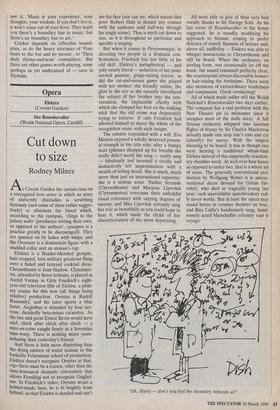Opera Elektra (Covent Garden) Der Rosenkavalier (Welsh National Opera, Cardiff)
Cut down to size
Rodney Milnes
At Covent Garden the curtain rises on a corrugated iron sewer in which an army of slatternly charladies is scrubbing furiously (and some of them rather sugges- tively) to eliminate the blood which, according to the synopsis, 'clings to the palace walls' (producers writing their own, as opposed to the authors', synopses is a practice greatly to be discouraged). They are spurred on by ladies with whips, and the Overseer is a dominatrix figure with a studded collar and an airman's cap.
Elektra is a Baader-Meinhof groupie, hair cropped, torn military greatcoat flung over a faded and tattered cocktail dress. Chrysothemis is Jean Harlow. Clytemnes- tra, attended by fierce lesbians, is played as Astrid Varnay in GOtz Friedrich's eight- year-old television film of Elektra, a prim- ary source for this new (all things being relative) production. Orestes is Rudolf Rassendyl, and his tutor sports a blue beret. Aegisthus is attended by four ner- vous, decidedly beta-minus catamites. As the late and great Ernest Bevin would have said, ditch after ditch after ditch — a Prase-en-scene caught firmly in a Seventies time-warp. There is nothing more yawn- inducing than yesterday's frisson.
And there is little more dispiriting than the dying embers of social realism in this basically Felsenstein school of production. Elektra doesn't recognise Orestes at first, ergo there must be a reason, other than the time-honoured dramatic convention that allows Fiordiligi not to recognise Gugliel- mo. In Friedrich's video, Orestes wears a helmet-mask; here, he is lit brightly from behind, so that Elektra is dazzled and can't see his face (nor can we, which means that poor Robert Hale is denied any contact with the audience until half-way through his single scene). Thus is myth cut down to size, as it is throughout so particular and specific a staging.
But when it comes to Personenregie, to directing two people in a dramatic con- frontation, Friedrich has lost little of his old skill. Elektra's metaphorical — and jolly nearly literal — seduction of her sister carried genuine, gorge-raising horror, as did the cat-and-mouse game she played with her mother: the friendly smiles, the glint in the eye as she casually introduced the subject of her brother into the con- versation, the implacable duelty with which she clamped her foot on the walking stick that the old crone was desperately trying to retrieve. If only Friedrich had allowed himself to direct the whole of the recognition scene with such insight.
The soloists responded with a will. Eva Marton enjoyed a wholly deserved person- al triumph in the title role: after a bumpy start (phrases chopped up for breaths she really didn't need) she sang — really sang — fabulously and invested a vividly and instinctively felt impersonation with a wealth of telling detail. She is much, much more than just an international superstar: she is a serious artist. Nadine Secunde (Chrysothemis) and Marjana Lipovgek (Clytemnestra) overcame their unhelpful visual references with varying degrees of success, and Miss Lipovgek certainly sang her role as beautifully as you could hope to hear it, which made the cliché of her characterisation all the more depressing. All were able to give of their very best vocally thanks to Sir George Solti. As his last series of Rosenkavalier in the house suggested, he is steadily modifying his approach to Strauss, coming to prefer delicacy of sound, fineness of texture and, above all, audibility — Elektra was able to whisper instructions to Chrysothemis and still be heard. When the orchestra, on sterling form, was occasionally let off the leash, the sound remained perfectly clear, the counterpoint always discernible howev- er hair-raising the fortissimo. There were also moments of extraordinary tenderness and compassion. Great conducting!
All of which made odder still the Welsh National's Rosenkavalier two days earlier. The company has a real problem with the New Theatre pit (a misnomer since it occupies most of the stalls area). A full Strauss orchestra whipped into luscious flights of frenzy by Sir Charles Mackerras actually made one stop one's ears and cry (silently) for mercy. With the singers shouting to be heard, it was as though one were hearing a traditional wham-barn Elektra instead of this supposedly reaction- ary chamber work. At well over four hours as opposed to under two, that is a whole lot of noise. The generally conventional pro- duction by Wolfgang Weber is in uncon- ventional decor devised for GOran Jar- vefelt, who died so tragically young last year: such unavoidable spatchcockery sad- ly never works. But at least the opera may sound better in roomier theatres on tour, and Rita Cullis's handsomely sung, hand- somely acted Marschallin certainly vaut le voyage.
'Oh, Harry — don't you feel the chemistry between us?'


























































 Previous page
Previous page